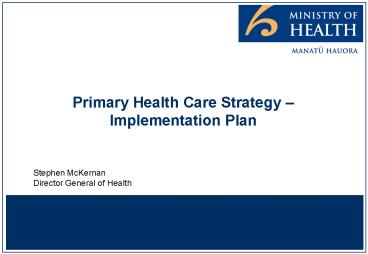Primary Health Care Strategy - PowerPoint PPT Presentation
1 / 14
Title:
Primary Health Care Strategy
Description:
Stephen McKernan Director General of Health The health system is experiencing a number of pressures, which will intensify Current pressures Workforce shortages at all ... – PowerPoint PPT presentation
Number of Views:280
Avg rating:3.0/5.0
Title: Primary Health Care Strategy
1
Primary Health Care Strategy Implementation
Plan
Stephen McKernanDirector General of Health
2
The health system is experiencing a number of
pressures, which will intensify
- Current pressures
- Workforce shortages at all levels
- Service failures
- Cost growth
- Safety and quality
- Health Targets
- Inequity of access
- Decisions in the national interest
- Pressures will intensify in the future
- Population growth, redistribution and ageing
- Increasing risk and prevalence of long term
conditions - Risk of a second wave of health inequalities
associated with obesity - Managing within an affordable funding path
- Effective utilisation of the available workforce
- Effective application of technological advances
and - Rising consumer expectations
3
Likely service configuration changes have been
identified
- Acute secondary and tertiary inpatient services
will consolidate into a smaller number of centres - Smaller district hospitals will use clustering,
regional services and networks to expand their
critical mass - Services will shift between professional groups
and to lower levels of care - Primary health care will have a greater role in
prevention, delivery of traditionally secondary
based services, and improved access to specialist
diagnostic testing - Information technology will enable an increase in
integration and self management
4
Challenges
- Sustainability funding, clinical, workforce,
demand/supply - Workforce capability/capacity
- Trust and relationships professional, PHO, DHB,
MOH - Clinical leadership, governance
- Performance improvement variability,
incentives/levers, measures, public info - National leadership versus local autonomy.
?centralised policy - Coordinated responses information, service
equity. ?sector oversight - Change in a commercial environment environment
that encourages progress and development - Reduced rate of funding growth
- Collaboration in a devolved environment
consensus difficult, variable - Collective good vs lowest common denominator
responses. ?Decision making processes needed
5
Possible direction
- Earned autonomy for capable PHOs
- Stronger clinical governance balanced
organisational governance - Clinical networks to drive performance/quality
- Flexibility on funding use
- Outcomes based contracting models improved
accountability measures - Partnership models with DHBs
- Strong locality focus, geographic?
- Delegated funding
- Extended range of services
- Minimum population
- Multiple contract models
- Incentives for capital investment for larger
practices to develop integrated service delivery
models
6
What platform do we build on?
- 80 PHOs established since 2002
- 4.0m people enrolled and patient satisfaction
remains high, by international comparisons - Access
- 50 reduction in schedule fees
- Very low cost access 1.16m New Zealanders
- Children lt 6 years 77 free
- Cheaper pharmaceuticals for all
- Greater use of services
- Services
- More focus on chronic conditions
- Innovative new approaches, and greater use of
nurses - Improving performance
- Practice accreditation Cornerstone/Te Wana
- PHO Performance Programme overall improvement,
but significant variation - Quality Improvement Committee
- Health Targets
7
Life expectancy gap between Maori and
non-Maori(1951 2006)
8
Unmet need for GP services (any reason), adults
by gender
NZ Health Survey, 1996/97, 2002/03, 2006/07
9
How well is New Zealand managing CVD risk?
10
Trends in smoking 1996-2007(NZ Health Survey)
11
Acute Coronary Syndrome
12
PHO Performance Programme
13
PHO Performance Programme
14
Government Priority Major Areas
- Reduce Endless Waiting
- Towards Better, Sooner and More Convenient
Primary Care - Improving Performance and Quality
- Strengthening the Health Workforce































